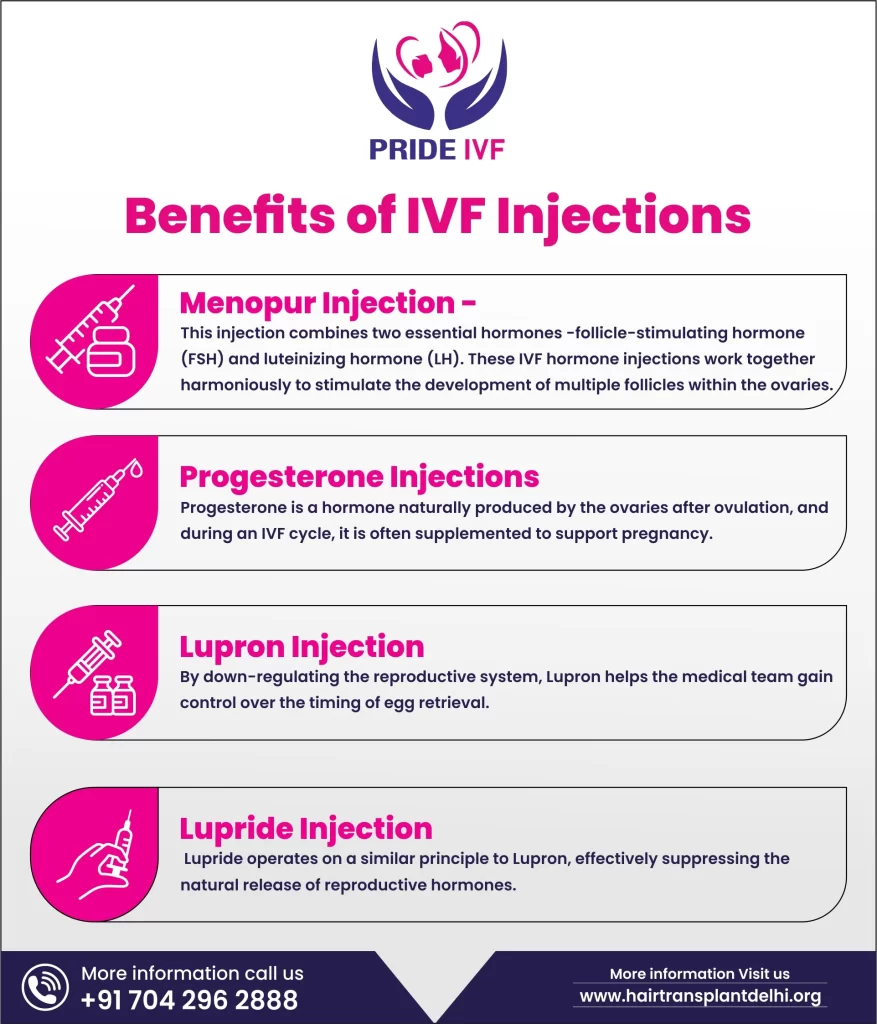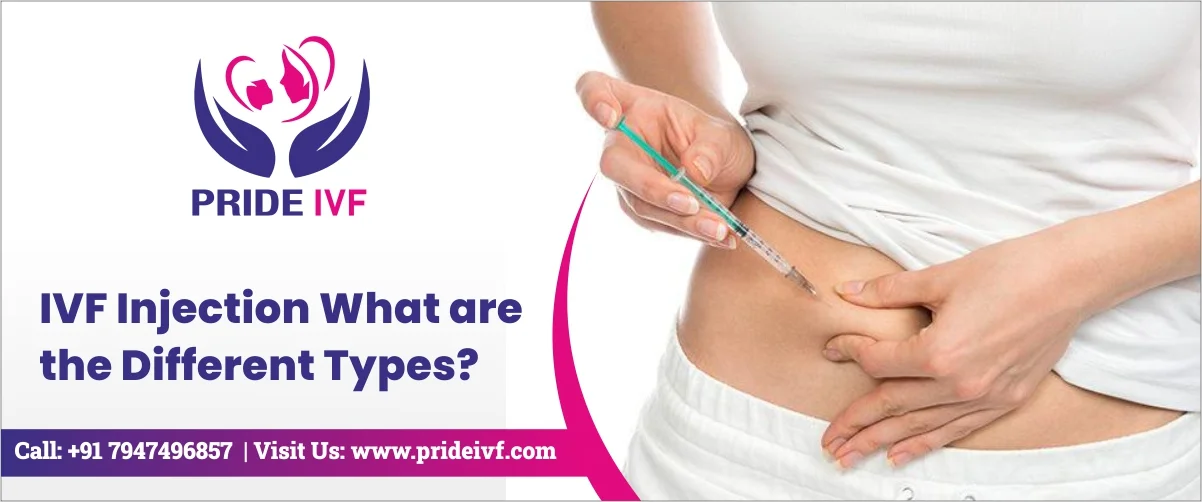In the world of infertility treatment, In Vitro Fertilization (IVF) has emerged as a beacon of hope for couples struggling to conceive naturally. This groundbreaking procedure has paved the way for countless individuals and families to realize their dreams of parenthood. At the heart of the IVF journey lies a vital element: the use of the IVF injection that plays a pivotal role in ivf process step by step. In this extensive blog, we will delve into the different types of IVF injections, their functions, and how they contribute to the success of fertility treatment at the best fertility clinic in delhi.




Understanding IVF and Its Necessity
In Vitro Fertilization, commonly known as IVF, is a fertility treatment that involves combining eggs and sperm outside the body in a laboratory dish. After fertilization, the resulting embryos are transferred to the woman’s uterus for potential implantation and pregnancy. IVF is often recommended for individuals or couples facing various fertility challenges, such as blocked fallopian tubes, male infertility, advanced maternal age, or unexplained infertility.
The decision to pursue IVF is never taken lightly. Many hopeful parents find themselves at a crossroads, grappling with feelings of frustration and uncertainty. It’s essential to consult with a fertility specialist who can assess individual circumstances and provide personalized recommendations.
Role of Injections in IVF
#IVF injections play a pivotal role in the treatment process. Unlike oral medications that are used in some infertility treatment in India, IVF requires injections to stimulate multiple follicles to grow and mature. Follicles are small fluid-filled sacs in the ovaries that contain the eggs.
The primary goal of IVF injection is to ensure the development of multiple eggs, increasing the chances of successful fertilization and implantation. In natural ovulation, typically only one egg is released each menstrual cycle. In IVF, we want to maximize the number of viable eggs to improve the chances of a successful pregnancy.
Commonly Used IVF Injections
Let’s delve into the most commonly used IVF injections and their functions:
Follicle-Stimulating Hormone (FSH) Injections
FSH injections directly stimulate the growth and maturation of multiple follicles in the ovaries. These injections contain purified forms of FSH and are carefully tailored to each individual’s specific needs. FSH injections are typically self-administered by the patient on a daily basis for about 8-12 days.
Human Menopausal Gonadotropin (hMG) Injections hMG injections combine both FSH and luteinizing hormone (LH) and are used in cases where FSH alone may not be sufficient. The addition of LH helps further support follicle growth and ovulation. hMG injections are also self-administered over a specified duration. Also Read: FSH Test.
Menopur Injection
Among the various IVF injections, Menopur injection holds a significant place in IVF treatment in delhi. This injection combines two essential hormones – follicle-stimulating hormone (FSH) and luteinizing hormone (LH). These IVF hormone injections work together harmoniously to stimulate the development of multiple follicles within the ovaries. By nurturing the growth of these follicles, Menopur sets the stage for a higher number of viable eggs, increasing the odds of ivf success rates.
Menopur is administered through subcutaneous injections, which may cause mild discomfort at the injection site. As with any medication, there are potential side effects to be aware of, such as headaches, bloating, and mood swings. However, the majority of women find these side effects to be manageable and temporary, especially when weighed against the potential rewards.
Progesterone Injections
Once the crucial process of egg retrieval and fertilization is completed, the focus shifts to preparing the uterine lining for embryo implantation. Progesterone injections play a vital role in this phase, ensuring the endometrial lining becomes receptive to the developing embryo.
Progesterone is a hormone naturally produced by the ovaries after ovulation, and during an IVF cycle, it is often supplemented to support pregnancy. Progesterone injections can be administered intramuscularly or through vaginal suppositories. While the idea of injections might seem daunting, many women find the process manageable, and the potential rewards make it well worth it.
As with any medication, some side effects of ivf injections may arise, such as irritation at the injection site, breast tenderness, or mild nausea. However, the support progesterone provides to the pregnancy journey far outweighs these temporary discomforts.
Also Read: How Many Injections For IVF Treatment?
Gonadotropin-Releasing Hormone Agonists (GnRH Agonists)
GnRH agonists temporarily suppress the body’s natural hormone production, preventing premature ovulation which could jeopardize the timing of egg retrieval, potentially leading to missed opportunities for successful fertilization. By doing so, they allow infertility specialist in india to have greater control over the timing of ovulation and egg retrieval.
GnRH agonists are typically administered in the early stages of an IVF cycle. While GnRH agonists are effective in preventing premature ovulation, they may cause temporary menopause-like symptoms, including hot flashes and mood swings.

Lupron Injection
Lupron injection, a GnRH agonist, steps in to address this concern by temporarily inhibiting the body’s natural release of reproductive hormones. Lupron injection IVF is typically administered in the initial phase of the IVF cycle, acting as a “pit stop” to prevent spontaneous ovulation.
By down-regulating the reproductive system, Lupron helps the medical team gain control over the timing of egg retrieval. While some women may experience mild side effects such as hot flashes or headaches during Lupron treatment, these are short-lived and subside once the medication is discontinued.
Lets get started
Lupride Injection
Lupride operates on a similar principle to Lupron, effectively suppressing the natural release of reproductive hormones. As medical science progresses, alternatives to established treatments emerge, offering flexibility and personalized care.
Lupride injection in IVF, another GnRH agonist, has gained popularity as a viable alternative to Lupron for ovulation regulation in IVF. The choice between Lupron and Lupride may be influenced by individual patient needs and medical history. Some patients find Lupride to be a preferable option due to its milder side effects or administration convenience.
Gonadotropin-Releasing Hormone Antagonists (GnRH Antagonists)
GnRH antagonists work similarly to GnRH agonists but act more quickly to prevent premature ovulation. They are typically administered later in the stimulation phase, closer to the anticipated time of ovulation.
GnRH antagonists are favored for their shorter duration of use and potentially fewer side effects compared to GnRH agonists.
HCG Injection
Following the delicate process of embryo transfer, the journey toward pregnancy takes a significant step forward. To support this crucial stage, the HCG injection (Human Chorionic Gonadotropin) comes into play.
HCG is a hormone that mimics the natural hormone produced by the embryo to signal its presence in the mother’s body.
By administering HCG injection after embryo transfer, the chances of successful implantation and pregnancy are substantially enhanced. HCG helps prepare the uterine lining for the embryo’s implantation, facilitating a nurturing environment for the developing fetus. In some cases, multiple HCG injections may be administered during the early stages of pregnancy to maintain adequate hormonal support.
Also Read: After Embryo Transfer Day By Day Symptoms , Diet During IVF Injections
Fertility Injections: The Pros and Cons
As we delve into the different types of fertility injections, it becomes evident that each offers distinct advantages and considerations. Menopur, with its combined FSH and LH action, effectively boosts ovarian stimulation. Progesterone injections IVF provide essential support for the uterine lining during embryo implantation. Lupron and Lupride, both GnRH agonists, ensure precise control over ovulation timing. Finally, the HCG injection serves as a beacon of hope for successful embryo implantation and pregnancy.
While the benefits of fertility injections are undeniably significant, it is crucial to recognize that they are not without their challenges. Potential side effects and the emotional impact of undergoing treatment must be acknowledged. However, with the guidance and support of a skilled medical team, coupled with determination and hope, many couples find the journey well worth the ultimate reward – a long-awaited bundle of joy.
Conclusion
As you journey toward parenthood, remember the hope that IVF injections bring. Each injection plays a crucial role in the process, offering the promise of new life. Embrace the support of loved ones and seek guidance from experts like International Pride IVF Centre. With their care and cutting-edge technology, you can turn your dream of having a child into reality. Take the first step and reach out to International Pride IVF Centre in Delhi to begin your path to parenthood. Remember, you are not alone, and the joy of a new life awaits. Embrace the possibilities and let your dreams take flight.




